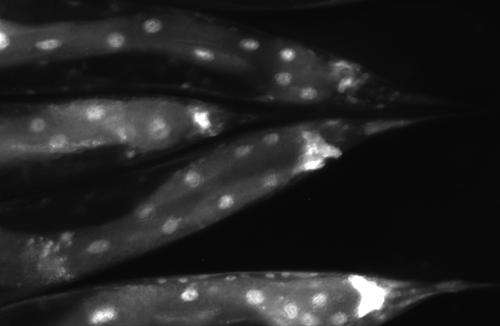Scientists identify key protein that modulates organismal aging

Scientists at Sanford-Burnham Medical Research Institute have identified a key factor that regulates the autophagy process, a kind of cleansing mechanism for cells in which waste material and cellular debris is gobbled up to protect cells from damage, and in turn, modulates aging. The findings, published in Nature Communications today, could lead to the development of new therapies for age-related disorders that are characterized by a breakdown in this process.
Malene Hansen, Ph.D., associate professor in Sanford-Burnham's Del E. Webb Center for Neuroscience, Aging and Stem Cell Research, and her team as well as collaborators found a transcription factor—an on/off switch for genes—that induces autophagy in animal models, including the nematode C. elegans, the primary model organism studied in the Hansen lab. This transcription factor, called HLH-30, coordinates the autophagy process by regulating genes with functions in different steps of the process. Two years ago, researchers discovered a similar transcription factor, or orthologue, called TFEB that regulates autophagy in mammalian cells.
"HLH-30 is critical to ensure longevity in all of the long-lived C. elegans strains we tested," says Hansen. "These models require active HLH-30 to extend lifespan, possibly by inducing autophagy. We found this activation not only in worm longevity models, but also in dietary-restricted mice, and we propose the mechanism might be conserved in higher organisms as well."
HLH-30 is the first transcription factor reported to function in all known autophagy-dependent longevity paradigms, strengthening the emerging concept that autophagy can contribute to long lifespan. In a previous study, Hansen and her colleagues discovered that increased autophagy has an anti-aging effect, possibly by promoting the activity of an autophagy-related, fat-digesting enzyme. With these findings, scientists now know a key component of the regulation of autophagy in aging.
Hansen's team is now working to find therapeutic targets, particularly upstream kinases, molecules that change protein function, which might actually phosphorylate the transcription factor to alter its function. "We already have a clue about the protein TOR, a master regulator that influences metabolism and aging in many species, but there might be other kinases that regulate HLH-30 or TFEB activity as well," says lead study author Louis René Lapierre, Ph.D., a postdoctoral fellow in Hansen's laboratory, and a recent recipient of a K99/R00 Pathway to Independence career award from the National Institutes of Health.
Autophagy has become the subject of intense scientific scrutiny over the past few years, particularly since the process—or its malfunction—has been implicated in many human diseases, including cancer, Alzheimer's, as well as cardiovascular disease and neurodegenerative disorders. HLH-30 and TFEB may represent attractive targets for the development of new therapeutic agents against such diseases.


















